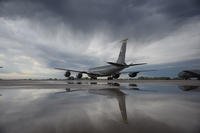AFGHANISTAN -- With the end of the war in Afghanistan drawing closer, the demand for an overwhelming presence of Marines is not needed.
A transition to an Afghan-led country is steadily occurring, and with that, the redeployment of U.S. forces.
Afghan independence means fewer Marines in Afghanistan, but these Marines need to be accounted for and proper planning must occur to get each of them home safely. This is where the job of Marine Air-Ground Task Force planning specialists like Cpl. Raymond H. Tulkki come into play.
“Really simply, it’s redeployment planning,” said Tulkki, about what his job entails. “My responsibility is to make sure all the commands under us get help. We work with Regional Command Southwest and (Marine Corps Forces Central Command) to get these guys flights home.
“Force management is a big part of it too. We have to make sure we don’t have too many Marines here,” added the 22-year old.
To ensure the numbers are correct and everything runs smoothly, Tulkki attends meetings with the executive officer of Regimental Combat Team 7.
“Every week we sit down with the XO,” said Tulkki. “We just look over to see how many guys we have on deck now and make sure the units that are coming in, aren’t coming in too heavy.”
Tulkki plays a vital role in a period of the war in Afghanistan where manpower management is critical.
“It’s a numbers game right now. We’re drawing down,” said Tulkki. “We can’t have too many people here because it’s not really our fight anymore. We’re the support now for Afghanistan.”
This is a change from his previous deployment to Afghanistan, where he saw a large increase in troops during the surge.
“I was in Afghanistan from October 2009 to October 2010,” said Tulkki. “We got on deck when the surge came, so it was a lot of Marines. Now coming back it’s different because we’ve cut down.”
“It’s not as many Marines, and the role has changed with the transition of security,” added the Phoenix native.
Tulkki has seen both sides of his job, having to process Marines into Afghanistan in support of a troop surge and now as a chief where he aids in monitoring the manpower numbers and keeping them at a conservative total.
As the date for Marines to fully transition out of Afghanistan grows closer, Marines like Tulkki will be called on more than ever.





























